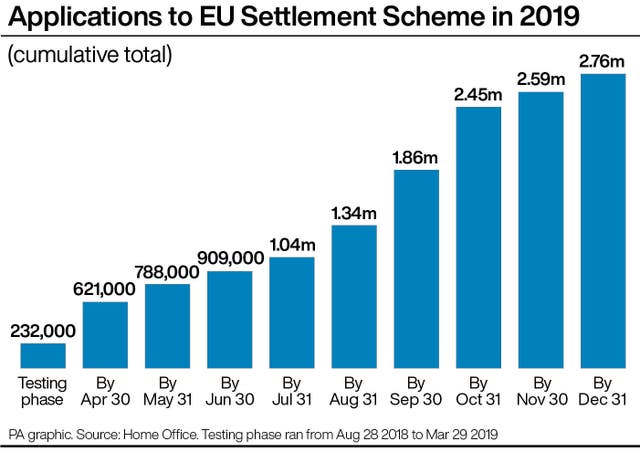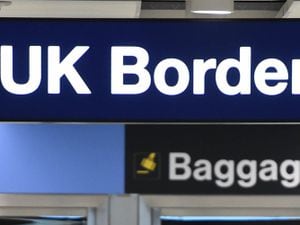Almost 2.5m EU citizens given right to remain in UK after Brexit
Applications from six ‘serious or persistent’ criminals have been rejected.

More than 2.45 million EU citizens have been told they can live and work in the UK after Brexit, while six “serious or persistent” criminals have been refused.
The number of applications submitted to the EU Settlement Scheme in December has hit more than 2.7 million (2,756,100), with 163,300 received in the last month, according to the Home Office.
Now 2,450,100 have been finalised, leaving a backlog of more than 300,000 still to process as applicants await a decision.
Of those dealt with in December, 55% (219,200) were granted permanent leave to remain in the country, called settled status, and 44% were granted pre-settled status – which means they have temporary leave to remain and would need to apply again for permanent permission at a later date.

Overall, six applications have now been rejected on “suitability grounds”, the Home Office report said.
These were valid applications from EU citizens that did not meet suitability criteria and were denied because the applicants are “serious or persistent criminals” with a history of crimes such as murder, rape and grievous bodily harm, the PA news agency understands.
The applicants are said to be already behind bars in the UK or have been deported and are seeking to return.
The Government has vowed to stop dangerous EU criminals coming into the UK by ending freedom of movement – something Leave campaigners had long argued was one of the reasons why Brexit was needed.
The Home Office criteria is seen to be a bid to protect the public and prevent a repeat of cases like that of Latvian Arnis Zalkans – who murdered his wife before moving to the UK in 2007 and going on to kill 14-year-old Alice Gross seven years later.
Slovakian Eduard Peticky was jailed for eight years in 1988 for raping two women in a park then travelled to the UK in 2008 and settled in Rotherham, South Yorkshire.
In 2015, he was convicted of a series of sexual offences including trafficking and engaging in sexual activity with a child.
Pro-EU campaigners reiterated concerns that the figures indicated rising numbers of EU citizens being granted temporary rather than permanent leave to remain – claiming some were eligible for settled status.
The Home Office said pre-settled status was typically granted to people who have lived in the country for five years and insisted applicants had been first offered the chance to prove they qualified for settled status.
In October, Security Minister Brandon Lewis indicated EU citizens could be deported if they did not apply by the December 2020 deadline.
On Thursday, he said: “EU citizens are our friends, family and neighbours and we value the huge contribution that they have made to our country.”
Meanwhile, Brexit Secretary Steve Barclay was meeting the European Parliament’s Brexit co-ordinator Guy Verhofstadt for talks in London as Downing Street defended the UK’s approach – and called for EU states to step up their reciprocal action.
The Prime Minister’s official spokesman said: “Our EU settlement scheme is providing certainty to millions of EU citizens across the country.
“It is far more than what other EU countries have done for UK nationals abroad. It’s now time for EU countries to step up and make the same generous offer to the UK nationals who live among them.”
Polish (512,300), Romanian (435,700) and Italian (291,000) nationals have submitted the highest number of applications, according to the latest figures.
The majority of applications were received from people already living in England (2,521,800), with 135,800 from Scotland, 44,700 from Northern Ireland and 44,100 from Wales.
All the figures are classed as experimental, meaning they are still being finalised and are not exact.
The Government is spending an extra £1 million advertising the scheme – in addition to £3.75 million already allocated for marketing – after a radio advert was banned for failing to make clear that further documentation as well as a passport or ID card would be needed to apply.
Applications can be submitted by computer, mobile app or post.
Under the scheme, EU citizens and their relatives, plus those from the European Economic Area (EEA) countries of Iceland, Liechtenstein and Norway as well as Switzerland, are asked to apply to confirm their immigration status so they can live and work in the UK when freedom of movement ends.
Relatives of EEA and Swiss citizens who are not from any of those countries but all live in the UK under EU law are also being urged to apply.
Once granted status, applicants can use the NHS, study and access public funds and benefits, as well as travel in and out of the country. But first they must prove their identity, show they live in the UK and declare any criminal convictions before the deadline.





